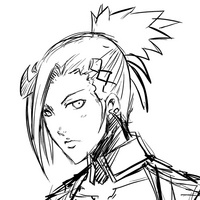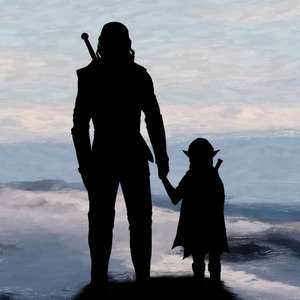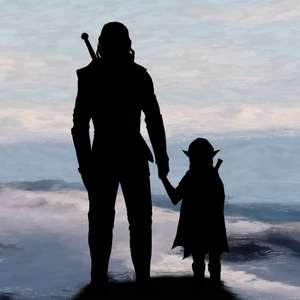Another year passed, and the child had grown enough to lift the blade that once belonged to the one known as Pinion, and her skill increased steadily. The form of the Hob is not so stout as that of Man, but they are fleet of foot, and what the girl-child lacked in strength her swift motions and sharp wit made amend for in her sword-skill.
That spring a farm-village appeared not far to the west of where the two had made their home. When he first spied it while gathering wild-wheat, Jaris began preparations to move their encampment again. But the peasants of the Realm who had come to till the fields feared the craggy rocks that guarded the precipice, and so he deemed their home safe from discovery. Jaris then traveled among the peasants and announced himself as one who gathers furs for sale, and he found them hospitable.
As there were many things necessary for civilized life that Jaris could not arrange through other means, he would go to trade hare-pelts with them now and again, and so gained many comforts for their mean hut among the rocks.
Among these things was a fine-woven tunic to replace the tattered rag and crude fur cloak Mara wore, the need for which he explained to the peasants by claiming it was for a family living elsewhere along the borderlands.
Another year passed, and the two became comfortable in their life there. Jaris, knowing Mara had little memory of Men other than himself, spoke thus to Mara that harvest season: “I have decided that you should walk the fields among the people there, and become accustomed to the sight of them, and speak to others than me. They fear the Hob, so I will travel south and find for you the cloak of a child of shame given over to the Church, that you might wear it to cover yourself and associate with them freely without revealing yourself.” This he did, for though not unkind theirs was a lonely existence.
Through these excursions, careful, always, Mara became acquainted with the ways of the Northlanders, and with the sight of others, and their voices, even coming to converse with them. It was through one such encounter that she came to know a farm-boy of similar stature, such that he might even be called a friend.
Jaris thought such familiarity unwise, but found it not in his heart to deny her companionship of one her own age. Unbeknownst to Jaris, the boy learned of her Hob nature, but their kind now being almost unknown in the area that had once been Myr, and he being but an innocent, was neither afraid nor unkind.
Perhaps it is that the gods gave this reprieve to the two without home nor solace but each other out of kindness. Or perhaps, as seems their pleasure, it was in preparation for cruel things yet to come, that the sting might be more keen. Be it one or the other, the days of peace continued into the winter, and the spring beyond, and until the summer sun high in the sky began to ripen the wheat upon the stalks.
It was then that a man tending his crop spied Mara, who had removed the cloak from her head in the heat, sitting upon a rock atop a hill while she waited for her companion in conversation to arrive. This man, being one who knew of the Hob, cried alarm and ran to her, and brought to bear his pick-fork against her.
Mara, having learned well the lessons taught her by Jaris, and carrying always the parry-dagger at her side in readiness for an occasion such as this, defended herself with skill that would be the envy of any squire. The peasant, disarmed handily, fled in fear, and Mara made quickly for her home.
She spoke of this to Jaris without delay, and he admonished her for her carelessness, and then made ready to leave their home and travel elsewhere, for it would not be long before suspicion became too great to continue their life in that place. It was on that night that Mara, in her first act of disobedience against the commands of Jaris, set out for the place where the farmers were, her sword upon her back and cloak drawn tight to conceal her in the darkness.
She stole through fields of ripening wheat lit silver by the orb of the greater moon, reaching the selfsame rock that sat atop a small hill where often she had spent time in conversation with the farm-boy, in hope most desperate that the boy might seek her there that night.
Seek her he did, and came to her in a state of great fear. Under the silver moon he said to her, “My parents, and all those in the village, are in great turmoil, saying that monsters called Hob have come from the west to burn our crops and take us children as slaves. Father described to me the creatures, and I thought it was you of which he spoke. That cannot be so. Tell me ’tis not.”
Mara hung her head into darkest shadow, and remembered what Jaris had told her of the ways of the Northlanders. “I fear that it is me of whom they speak, indeed. But I am no monster, and the one who has raised me as my father is of Man, just as you. And there are no Hob to come but myself, and I mean no harm to any-one.”
The farm-boy was saddened by this, and said, “Then I am sorry, but we must speak no more. I would think you a friend if I still could, but I fear that if we are seen with each-other I will be cast off by my family, and have no-where to go. Now leave, before they find you, and bring you to harm.”
And then he ran away from her, through the moon-silvered wheat stalks, and the two were fated to never meet again.
Mara returned to the hut where Jaris waited, head hung low in sorrow, and when she arrived Jaris was aggrieved but did not chastise her, only inquiring as to where she had gone.
“I am sorry for my disobedience, father,” she replied to him. “I went just now to see my friend among the farmers, and he said that I am a monster and we must never speak again. Why is this so, father? Am I truly such a monster?”
This question had Jaris long expected, yet the hearing of it saddened him, for not so many seasons past his answer would have been no different than the people of the village where the farm-boy lived. “Nay, Mara. You are a Hob, who are different from Man in many ways, but are no monster. Even so, you must not think ill of the farmers, for they know no better. There has long been strife between the Hob of the mountains and the Northlanders, and their fear is not without foundation.”
“Why then must I be Hob?” asked she. “Is there no magic that will make me like the others, that I might play with them without hiding my face?”
“Nay, child, there is not. I know not why the gods make us what we are, but once we are born into this world we have no choice but to walk the path that stretches out in front of us, and until that day when you are strong enough to walk the path alone I will care for you. Perhaps a time will come when Hob and Man can live in peace together, but you must not pine for things that may never be. Now dry your eyes and gather up your things, and we will seek another place to live.
And so Jaris and Mara abandoned their mean hut in the Northlands and again set out, this time with intent never to stay too long in one place, lest suspicious eyes fall upon them.











Comments (0)
See all